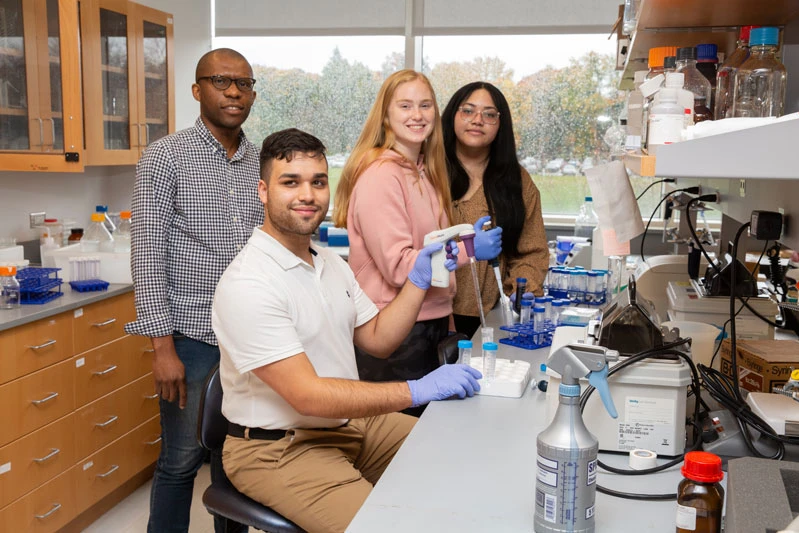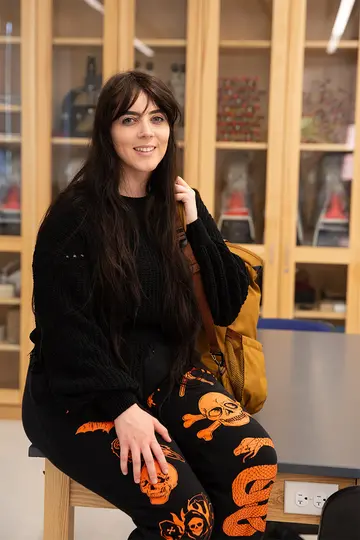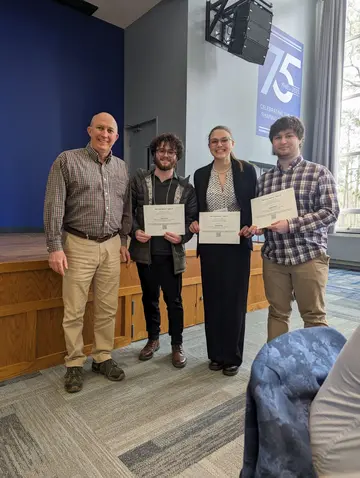Prominent journal publishes COVID-19 research compiled by Biology professor, students

The team comprised of Dr. Emeka Okeke and three students – Joshua Ninan, Caitlin Snyder and Esmeiry Ventura – compiled a research study that examined the role of immune cells in inflammation and mortality in severe cases of COVID-19. Their study has been published in the journal Frontiers in Immunology.
The role of immune cells in driving inflammation and mortality in severe cases of COVID-19 was the focus of a research study, compiled by Department of Biology Assistant Professor Emeka Okeke and three science students at the SUNY Fredonia, that has been published in the prestigious journal Frontiers in Immunology.
The three students are: Joshua Ninan, a senior majoring in Biology, graduate of Cattaraugus-Little Valley High School, from Cattaraugus; Esmeiry Ventura, senior, majoring in Biochemistry, with a Chemistry emphasis, in the pre-med program, a graduate of Hicksville High School in Melville; and Caitlin Snyder, junior, majoring in Biochemistry and graduate of Notre Dame High School in Utica.
Frontiers in Immunology is the official journal of the International Union of Immunological Societies.
“Neutrophil Extracellular Traps, Sepsis and COVID-19 – A Tripod Stand” highlights the role of white blood cells, called neutrophils, in driving inflammation and mortality in severe cases of COVID-19, Dr. Okeke said. “Viruses like SARS-CoV-2 cause neutrophils to release their proteins in a way similar to a spider’s web, which we call neutrophil extracellular traps (NETs), and this propagates inflammation.”
“About 20 percent of COVID-19 patients progress to severe disease and our research highlights the contribution of NETs to severe cases of COVID-19,” Okeke explained. The work is highly significant because understanding the immunopathology (the immune responses associated with a disease) of COVID-19 is critical for the development of effective therapeutics that will reduce deaths in COVID-19 and bring an end to the world-wide pandemic, Okeke said.
The research discusses evidence indicating that severe COVID-19 has clinical presentations consistent with the definitions of viral sepsis, a potentially life-threatening condition that occurs when the body’s response to an infection damages its own tissues and can result in organ failure and death. The role of neutrophils and NETs formation in the pathogenesis – the origin and development of a disease – of severe COVID-19 is highlighted in the study.
Ms. Ventura analyzed the role of neutrophils in diseases, such as sepsis and COVID-19, by researching scientific literature and clinical trials. “I primarily focused on the role of Neutrophil Extracellular Traps (NETs) in sepsis and COVID-19 and targeting NETs in COVID-19,” Ventura said. “I researched many different clinicals trials of NET inhibitors for COVID-19 treatment.”
Ventura said this experience has helped her grow as an undergraduate student and expand her knowledge in scientific research. It has taught her how to take initiative and to be able to work with a small team of other students.
“I makes me happy that I get to share with the world the importance of neutrophils and how that can affect medical complications like autoimmune diseases. After reading many other research papers in preparation for writing this one, I've gathered a lot of skills,” she said, and have learned how to write scientifically.
“I've also learned about the process of publishing a research paper,” said Ventura, who plans to become a dermatologist. “Overall, this publication has exposed me to the professional world of scientific research.”
“By researching to find evidence of these NET proteins in severe cases of COVID-19, I learned how to navigate credible sources in order to find the information needed.” - Caitlin Snyder
Fine-tuning of research skills was a major takeaway from the research study for Snyder.
“This was the first time I had been asked to assist with a publication and I learned a lot,” Snyder said. “By researching to find evidence of these NET proteins in severe cases of COVID-19, I learned how to navigate credible sources in order to find the information needed.” Snyder has applied these skills to other papers she writes.
Snyder’s goal after graduation is to attend medical school and become an OBGYN physician.
Drugs that prevent or inhibit the formation of NETs are potential candidates for the treatment of COVID-19, the study concludes. “As our understanding of the molecular mechanisms of neutrophil extracellular trap formation increases, more therapies targeting neutrophil extracellular traps will become available and may hold promise for the effective treatment of severe COVID-19,” the study suggests.
More research is needed to understand neutrophil behavior during SARS-CoV-2 infection which is responsible for the COVID-19 pandemic. Several labs all over the world are currently testing inhibitors of neutrophil extracellular trap formation for the treatment of COVID-19.
The students compiled literature research and wrote portions of the manuscript. Okeke edited the manuscript prior to publication. All authors contributed to the article.
This research compiled by the students in Okeke’s lab during the summer of 2021 has prepared them for further research at graduate school after they receive their undergraduate degrees, Okeke said.
The Frontiers in Immunology article can be found at: Frontiers | Neutrophil Extracellular Traps, Sepsis and COVID-19 – A Tripod Stand.
“My laboratory is committed to finding new therapies for controlling the inflammatory response of immune cells,” Okeke said. “We are currently exploring the anti-inflammatory activity of proteins derived from potato.”
A novel protein from potato with anti-inflammatory activity has been recently identified in the lab, Okeke noted, and this finding was recently published in the scientific journal Molecules, a peer-reviewed, open access journal of Chemistry. Okeke and Ventura were among the study’s authors.
The article published in Molecules can be found at: Molecules | Free Full-Text | TNKPVI, a Putative Bioaccessible Pharmacophore of Anti-Inflammatory Potato Patatin-Derived Decapeptide DIKTNKPVIF



